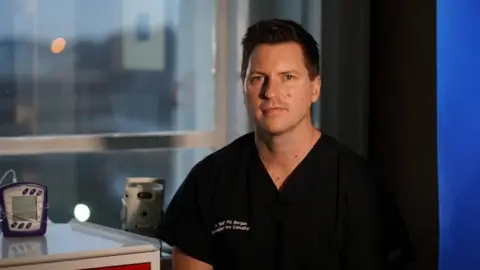Coronavirus: Doctor's letter to older and vulnerable patients
 Victoria Cummings
Victoria CummingsA doctor says he has been humbled by the response to an open letter he wrote to reassure older and more vulnerable people concerned about coronavirus.
Intensive care consultant Matt Morgan, from the University Hospital of Wales, Cardiff, wrote: "We will be honest, we will hold your hand, we will be there.
"[Sometimes] intensive care offers no fix... but there is always care."
Older people and those with health problems are at greater risk of developing severe symptoms.
A total of 60 people have been diagnosed with the virus in Wales and the total number of confirmed cases in the UK has reached 1,140.
Dr Morgan wrote: "It must be so hard listening to endless news reports that end with 'don't worry, this illness mainly affects the elderly, frail, vulnerable, or those with serious underlying health conditions'. What if that is you?
Allow X content?

"Although we have fancy machines, powerful drugs, and talented staff, none of these things cure every disease. All they do is give us time - time to work out what is wrong, time to hopefully treat it, and time for people to get better.
"But sometimes we already know what is wrong, we already know that there is no effective treatment. And so sometimes the machines offer little, intensive care offers no fix. But hope is not lost. We have not forgotten about you.
"And if these things are still not enough, we will sit with you and with your family. We will be honest, we will hold your hand, we will be there. We will change our focus from cure but most importantly we will continue to care. We have not forgotten about you."
Many other medics responded on Twitter describing the letter as "brilliant" and "superb".
Another said: "You explain this situation so well."
Dr Morgan said he was "pretty surprised, humbled and pleased" by the response and said he had written the letter as "a human being, a dad, a son with elderly family and family with long-term health conditions."
He added: "There's a huge amount of focus on treatment and cures, which is great, but often in intensive care there isn't a treatment or cure - but there is always care."

- EASY STEPS: How to keep safe
- A SIMPLE GUIDE: What are the symptoms?
- GETTING READY: What is the UK's 'delay' phase?
- TRAVEL PLANS: What are your rights?
- IN-DEPTH: Coronavirus pandemic

